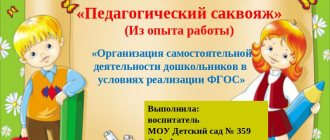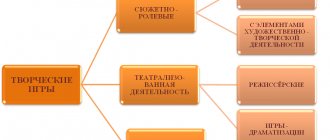Organization of play activities for preschoolers in the context of the introduction of the Federal State Educational Standard for Education. - presentation
Organization of play activities for preschool children in the context of the introduction of the Federal State Educational Standard for Education
Play activity and play are two different things. Play is not a universal form of life for all children, it is a historical education. Play arises only at certain stages of social development, when the child cannot take direct part in the system of social labor, when an “empty” period of time arises, when it is necessary to wait for the child to grow up. D. B. Elkonin Game activity is a special sphere of human activity in which a person does not pursue any other goals other than obtaining pleasure, pleasure from the manifestation of physical and spiritual forces. O. S. Gazman
The role of play in a child's development Purposeful nature of play; Fostering determination in children; Developing a desire to bring the work started to its logical conclusion; Formation of responsibility for one's actions; Development of the ability to put plans into practice; Developing the ability to negotiate with playing partners; Formation of the ability to evaluate and respect the opinions of others; Raising other positive qualities in children.
Functions of gaming activity Cognitive. The child learns to experiment, predict, model, and explore. Entertaining. Aimed at arousing the child’s interest, inspiring, providing pleasure, and entertaining. Communicative. Aimed at developing speech mechanisms of communication. Function of Self-realization. It comes down to choosing a role. Game therapy. Provides for children to overcome difficulties of various types that arise in other types of activities. Diagnostic. It will help the child to know his or her capabilities, and the teacher will help to identify the presence or absence of deviations from normal behavior. Another feature of play activity is that the child becomes accustomed to social and cultural norms and learns values, rules of human society and is included in the system of social relations.
To develop play activities, the teacher must: create conditions during the day for children to play freely; identify play situations in which children need indirect help; watch children playing and understand exactly what events of the day are reflected in the game; distinguish children with developed play activity from those whose play is poorly developed; indirectly lead the game if the game is stereotypical (for example, offer new ideas or ways to implement children's ideas) know the children's subculture: the most typical roles and games of children, understand their significance establish the relationship between the game and other activities. Spontaneous play is not so much a means of organizing learning as an intrinsically valuable activity for children.
Developing subject-game environment Easily transformable; Updated children themselves participate in updating the gaming environment; Parents should also have the opportunity to contribute to its improvement.
Organization of gaming activities in preschool educational institutions Gaming activities consist of 7 components: 1. Rules. Thanks to rules, children develop arbitrariness. Arbitrariness is the ability to manage one’s actions and control them. 2. Role. Role is a scheme of action of a game character in different situations. The role carries a moral message. Only an adult can reveal a moral message for children. 3. Plot. The plot is the outer shell of the game. The plot reflects the area of social reality that children reproduce in their play. 4. Contents. The content of the plot-role-playing game is what is reproduced by the child as the main thing in human relationships. 5. Imaginary situation. 6. Game relationships. Game relationships reflect relationships in plot and role. 7. Real relationships. Real relationships are the relationships between children as partners, comrades doing a common task.
Classification of games Games that arise on the initiative of a child Games that arise on the initiative of an adult who introduces them for educational and educational purposes Games that come from historically established traditions, ethnic groups (folk), which can arise on the initiative of both an adult and older children Independent Games Game - experimentation; Independent plot games Plot-display, Plot-role-playing (creative) Director's Theatrical educational games: didactic, plot-didactic, moving; leisure games: games - fun, games - entertainment, intellectual, festive - carnival, theatrical - staged, traditional or folk (historically they form the basis of many games related to educational and leisure
Planning game activities An adult with several children (3-4 people) draws up a plan for a future joint game in advance: distributes roles, determines the order of actions, responsibilities of each character, his character, intermediate and final stages of the game. At the same time, the teacher does not dictate his decisions, does not impose his plans, but constantly consults with the children, willingly accepts and supports any proposal coming from them. You can offer any plots of role-playing games that are familiar and accessible to preschoolers, where there are roles that are clear and attractive to them, for example: “Hospital” (roles: doctor, nurse, ambulance driver, patient); “Street” (roles: policeman, gas station worker, drivers, car repairman); “Concert” (roles: entertainer, artists, spectators). Having discussed in detail and determined the plan for the upcoming game and the procedure for each character, the teacher, together with the children, begins to act out the plot. He makes sure that children do not deviate too much from the planned plan, but at the same time encourages all proactive actions within the role. After the game, the adult talks to each participant and asks what they played, what they did during the game, what they liked most and what they didn’t like. The adult is especially interested in the character whose role the child played, his story about his own actions and their compliance with the intended plan.
Summary Play, on the one hand, creates a child’s zone of proximal development, and therefore is the leading activity in preschool age. This is due to the fact that new, more progressive types of activity are emerging in it and the formation of the ability to act collectively, creatively, and arbitrarily control one’s behavior. On the other hand, its content is nourished by productive activities and the ever-expanding life experiences of children. This leads to obvious advice: play with your child as much and as often as possible. An ordinary children's game (role-playing or with a rule) cannot be replaced by video films with cartoons, computer games, or the most intricate construction set. Because when playing, a child needs to control his behavior and understand what he is doing and why.
Presentation on the topic “Game activities in kindergarten”presentation on the topic
Slide 1
MUNICIPAL PRE-SCHOOL EDUCATIONAL INSTITUTION KINDERGARTEN No. 6 Malyshok, Ershov, Saratov Region Educator Makarova I. A “We play together. Assorted games for social and communicative development"
Slide 2
Anton Semyonovich Makarenko as an outstanding Soviet teacher “Play is important in the life of a child, it has the same meaning as activity, work, service for an adult. What a child is like at play, so in many ways he will be at work when he grows up. Therefore, the education of a future leader occurs, first of all, in play. And the whole history of an individual person as an activist and worker can be represented in the development of play and in its gradual transition into work.”
Slide 3
“For preschool children, games are of exceptional importance: play for them is study, play for them is work, play for them is a serious form of education. Play for preschoolers is a way of understanding the environment” N.K. Krupskaya From a child’s point of view, play is getting maximum pleasure from life. From the point of view of a specialist, play is a leading activity in childhood that gives the child the opportunity to develop. From a parent's point of view, play is anxiety, trouble and chaos in the room.
Slide 4
Social and communicative development of preschool children One of the main aspects of readiness for systematic learning is social and communicative skills. Sociability and the ability to communicate with other people are a necessary component of a person’s self-realization and success in various types of activities. The social and communicative development of preschool children occurs through play as a leading children's activity. Communication is an important element of any game. During play, the child’s social, emotional and mental development occurs. Play gives children the opportunity to recreate the adult world and participate in an imaginary social life. Children learn to resolve conflicts, express emotions and interact appropriately with others.
Slide 5
Speech is one of the important lines of child development. Thanks to their native language, children enter our world and receive ample opportunities to communicate with other people. One of the most important sections of verbal communication is vocabulary enrichment. Logical, rich speech is the key to success in many areas of knowledge.
Slide 6
While playing, children can express themselves in different ways. They interact either in pairs (with a leader or a partner), then in threes or fours, or with the whole group. Games create a special space in which children gain new experiences, develop social, emotional, physical, and intellectual abilities, and prepare for new life demands, including school ones.
Slide 7
Classification of games Creative games And games with rules Folk
Slide 8
Creative games Theatrical Theatre-role-playing Design Directing Dramatization games With elements of artistic and creative activity With elements of labor
Slide 9
Everyone has a “Childhood Shore” in their life, where there is a sea of fairy tales and magical dreams. You can’t look at this beauty enough... I really want to come back again and again... The blue sea awaits us. In places! Full speed ahead! I see the island of fairy tales. Who lives there, friends? Objectives: to develop artistic taste, creative abilities, to form a sustainable interest in theatrical art. By participating in theatrical games, children learn about the world around them and become participants in events from the lives of people, animals and plants. The themes of theatrical games can be varied. Theatrical games
Slide 10
- a type of unproductive activity, the motive of which lies not in its results, but in the process itself. All aspects of the personality are involved in the game: the child moves, speaks, perceives, thinks; During the game, all his mental processes are actively working: thinking, imagination, memory, emotional and volitional manifestations are intensified. Each such game is characterized by: theme, game concept, plot, content and role. Role-playing game “Beauty salon” “At the doctor’s appointment”
Slide 11
Games with rules Didactic Outdoor games for orientation in space with running and jumping with climbing with throwing and catching and games with objects verbal and board-printed
Slide 12
“Call it in one word”
Slide 13
“Find the extra one” “Call me kindly”
Slide 14
Outdoor games Play can be a means of self-knowledge, entertainment, recreation, and a means of physical and general education. The importance of outdoor games is great: they are both a means and a method of raising a child. Outdoor play is characterized by a variety of effects on the child due to physical exercises included in the game in the form of motor tasks. Based on the general goals of physical education of preschoolers, we will highlight the main tasks that are solved when conducting outdoor games. These include: health, educational and educational.
Slide 15
collective individual plot seasonal ritual games-attractions games-fun games - traps theatrical household Folk games
Slide 16
All ancient holidays, rituals and actions, games - be it a round dance, walking on coals or just children's fun, where children measure their strength and dexterity - always have a dual character. On the one hand, this is a kind of theatrical performance that is interesting both for the participants themselves and for the audience, and on the other hand, almost every element of such a performance carries within itself a certain sacred and educational principle. Folk outdoor games promote the development of intelligence, concentration, coordination of movements and visual perception, as well as the development of imagination, expressiveness of speech, and communication skills. Folk games
Slide 17
Thus, the phenomenon of play should be treated as a unique phenomenon of childhood. It is important to develop in preschoolers the ability to build relationships with others on the basis of cooperation and mutual understanding, to ensure general mental development, to form the prerequisites for educational activities and qualities necessary for adaptation to school and successful learning in primary school. Adults open up the future for children, act as mediators and accomplices in relation to children’s activities in order to help children gain their own experience.
Slide 18
Creative success to you!!!



